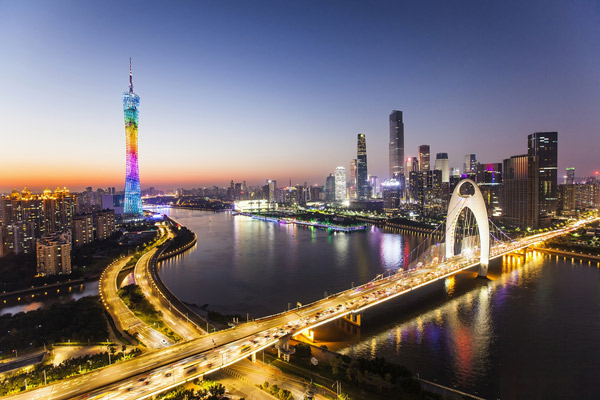Guangzhou sees new development opportunities
 |
|
Night view of the Canton Tower and the central business district of Zhujiang New Town in Guangzhou, South China's Guangdong province, Dec 7, 2016. [Photo/VCG] |
Guangzhou - STV Sakai (Guangzhou) International Science and Technology, a subsidiary of the world's largest electronics contractor Foxconn Technology Group, has formally completed registration in China's southern Guangdong Province, according to local customs.
STV Sakai, with a registered capital of 21 billion yuan ($3 billion), plans to invest 50 billion yuan to produce the 10.5 generation panel, substrate glass and related product lines.
It is the biggest foreign investment project in four decades in Guangzhou, capital of Guangdong.
In 2016, 1,757 foreign-invested companies in Guangzhou were established, year-on-year growth of 23 percent. The actually used foreign investment amounted to 5.7 billion dollars, year-on-year growth of 5.3 percent.
"Compared with five years ago, the total volume of the actual use of foreign investment in Guangzhou in 2016 increased by one-third, showing a steadily progressing trend," said Chen Jie, director of Guangzhou Municipal Commission of Commerce.
By the end of 2016, 288 of Fortune Global 500 companies had operations in Guangzhou, including Cisco Systems (China), which invested 20 billion yuan in the Cisco (Guangzhou) Smart City project, aiming to build the largest platform of Internet R&D and intelligent operations, outside the United States.
"The project offers a great opportunity to present an innovative example to the world," said Chuck Robbins, Cisco Global CEO.
Guangzhou has been an important foreign trade port in China for over 2,000 years and is known as the "Millennium Business Capital." It is attracting more global investors due to its improving investment environment.
It has developed a complete industrial chain with 10 key sectors: automobile manufacturing, fine chemicals, trade exhibition, financial insurance, modern logistics, information technology, biological medicine, new materials, new energy and environmental protection.
The city has strong support in innovation and entrepreneurship. It boasts two-thirds of the province's universities, 97 percent of national key disciplines and every type of key state lab. It has 2.88 million people with a college degree or above 1.41 million technical and managerial employees.
The Guangdong free trade zone was set up to boost foreign investment in 2015. The trade zone has implemented a series of innovation measures such as in cross-border renminbi business, financial exchange, shipping logistics, trade, and government services.
Guangzhou has also devoted itself to a new round of reform. Many effective measures such as industrial and commercial registration, tax relief and customs clearance have been implemented.
"Guangzhou will seize opportunities to build itself into a network city and establish a high-level open economic system," Chen said. "With the improvement of industry vitality, infrastructure, business cost, talent and innovation, the city will attract more global capital, technology, talent and information, and make itself more internationally competitive."









